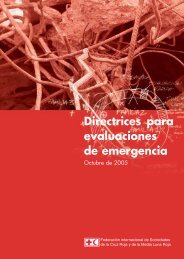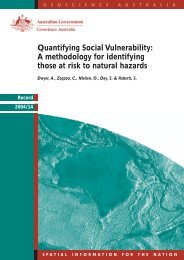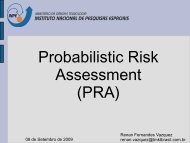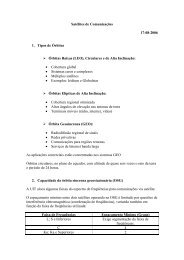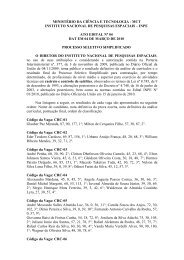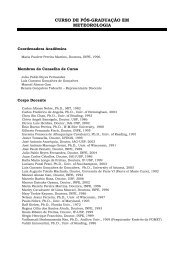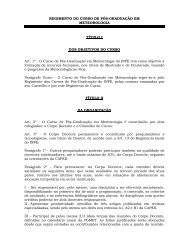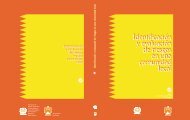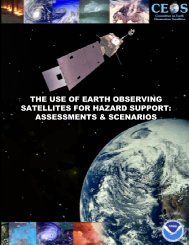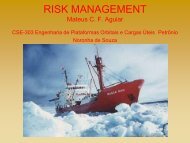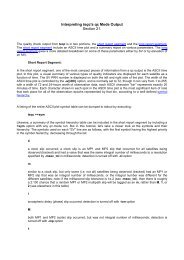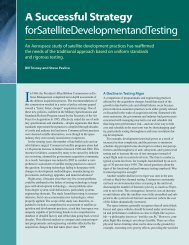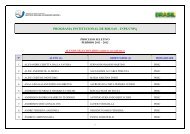Living with Risk. A global review of disaster reduction initiatives
Living with Risk. A global review of disaster reduction initiatives
Living with Risk. A global review of disaster reduction initiatives
You also want an ePaper? Increase the reach of your titles
YUMPU automatically turns print PDFs into web optimized ePapers that Google loves.
6<br />
<strong>Living</strong> <strong>with</strong> <strong>Risk</strong>: A <strong>global</strong> <strong>review</strong> <strong>of</strong> <strong>disaster</strong> <strong>reduction</strong> <strong>initiatives</strong><br />
ment, natural <strong>disaster</strong> <strong>reduction</strong> and risk<br />
management. It adopted a number <strong>of</strong><br />
recommendations some <strong>of</strong> which were later<br />
adopted by the commission.<br />
Experts recommended, in particular, to<br />
systematically include hazard proneness<br />
and gender-based vulnerabilities in environmental<br />
impact assessments. They also<br />
reiterated the importance <strong>of</strong> women's<br />
participation in decision-making in public<br />
administration and in governmental structures<br />
at all levels.<br />
Experts also highlighted the necessity to<br />
introduce a gender perspective into the<br />
ongoing research on the relationship<br />
between climate, natural hazards, <strong>disaster</strong><br />
and related environmental vulnerability.<br />
They stressed the need to use gender-sensitive<br />
indices and indicators and further<br />
pointed out the need to develop instruments<br />
for including gender analysis in local<br />
<strong>disaster</strong> risk management.<br />
The Commission on the Status <strong>of</strong> Women<br />
in 2002 also called for the integration <strong>of</strong><br />
gender perspectives in the implementation<br />
<strong>of</strong> all policy documents and treaties related<br />
to sustainable development and in the<br />
<strong>review</strong> <strong>of</strong> the implementation <strong>of</strong> the Yokohama<br />
Strategy for a Safer World.<br />
Email: daw@un.org<br />
Web:www.un.org/womenwatch/daw<br />
The Habitat agenda<br />
More vulnerable cities…<br />
As more and more people move to cities, the pressure on the<br />
land increases. Often, the poorest end up in badly-built<br />
housing in high density areas on marginal land such as<br />
exposed coastal areas, river deltas and steep slopes. These<br />
are the same areas likely to have the poorest supply <strong>of</strong><br />
water, the most rudimentary sewage disposal, and where<br />
government is least likely to enforce safety standards. These<br />
are the places where, in the event <strong>of</strong> a <strong>disaster</strong>, the rescuers<br />
will find it hardest to get to.<br />
The Habitat agenda was defined during the Second<br />
United Nations Conference on Human Settlements in Istanbul,<br />
1996. It includes a series <strong>of</strong> commitments and guiding<br />
principles for sustainable cities. Most <strong>disaster</strong>s are<br />
caused by vulnerabilities created by human action such as<br />
uncontrolled or inadequately planned human settlements,<br />
lack <strong>of</strong> basis infrastructure and the occupation <strong>of</strong> <strong>disaster</strong><br />
prone areas. The most efficient and effective <strong>disaster</strong><br />
preparedness systems are usually provided at the neighborhood<br />
level through volunteer contributions and local<br />
authority actions. Specific actions are required at the<br />
appropriate levels <strong>of</strong> central government and local<br />
governments in close coordination <strong>with</strong> the private sector<br />
and all community groups.<br />
UN HABITAT takes actions in improving <strong>disaster</strong><br />
management in human settlements by working <strong>with</strong> partners<br />
that include local governments, insurance companies,<br />
NGOs and the academic, health and scientific<br />
community. The goal is to adopt appropriate norms for<br />
land use, building and planning standard.<br />
298<br />
Chapter III - Commitments ….Sustainable human settlements<br />
"We commit ourselves to the goal <strong>of</strong> sustainable human settlements in an urbanizing world by developing<br />
societies that will make efficient use <strong>of</strong> resources <strong>with</strong>in the carrying capacity <strong>of</strong> ecosystems and take into<br />
account the precautionary principle approach, and by providing all people, in particular those belonging to<br />
vulnerable and disadvantaged groups, <strong>with</strong> equal opportunities for a healthy, safe and productive life in<br />
harmony <strong>with</strong> nature and their cultural heritage and spiritual and cultural values ….." "Preventing manmade<br />
<strong>disaster</strong>s, including major technological <strong>disaster</strong>s, by ensuring adequate regulatory and other measures<br />
to avoid their occurrence, and reducing the impacts <strong>of</strong> natural <strong>disaster</strong>s and other emergencies on human<br />
settlements, inter alia, through appropriate planning mechanisms and resources for rapid, people-centred<br />
responses that promote a smooth transition from relief, through rehabilitation, to reconstruction and development,<br />
taking into account cultural and sustainable dimensions; and rebuilding <strong>disaster</strong>-affected settlements<br />
in a manner that reduces future <strong>disaster</strong>-related risks and makes the rebuilt settlements accessible to<br />
all" Extract from the Habitat Agenda, Istanbul 1996.<br />
In the five-year follow up <strong>review</strong> <strong>of</strong> the Habitat Agenda in 2001, renewed commitment to engage in <strong>disaster</strong><br />
preparedness and risk <strong>reduction</strong> was stated.



